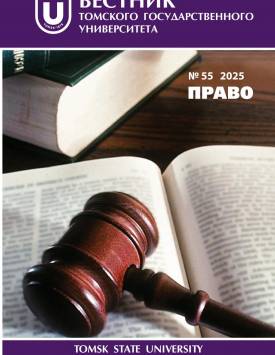Features of digital transformation of rural municipalities: a constitutional and legal study
The study of the features of the legal regulation of the institute of local self-government in the context of the active introduction and development of digital technologies is not just an urgent research topic, but a state-required task facing modem scientists for the qualitative implementation of the stated state policy. Given that Russia is a historically agrarian state, one of the tasks is to find optimal ways of digitalization in rural municipalities. We suggest examining the successes achieved in this matter, as well as identifying the risks that, in our opinion, may make the realization of this ambition questionable. In modern legal science, a position has been formed according to which the terms "digitalization" and "digital transformation" are not identical. Digitalization is distinguished by the fact that it is a process of introducing and using existing and new technologies. If we talk about "digital transformation", the main distinguishing feature is that it covers a wider range of changes related to the use of digital technologies, since it focuses on a comprehensive, strategic transformation of processes in order to adapt to changing conditions and use digital opportunities to create new values and achieve competitive advantage. In the course of the research, the correlation of similar but not identical concepts in the field of digital transformation was carried out and the categorical and conceptual apparatus was built. Reasoned conclusions on the organizational and technological readiness of municipalities in the Russian Federation for digitalization are presented, the causes are identified and criteria for determining and overcoming the digital inequality of municipalities are proposed. The reasons for the independent study of the digital transformation of rural settlements are highlighted. The main trends, as well as objective and subjective potential problems hindering the introduction of digital technologies into the activities of municipal authorities in the Russian Federation, which must be taken into account in regulatory design at the municipal level, are shown. A set of conclusions and proposals on strategic planning of digitalization and digital transformation processes at the municipal level is presented, taking into account the peculiarities of rural development, which are seen in the adoption of an independent concept of "Smart Village". A proposal has been formulated aimed at preparing a special strategic planning program document that ensures the digitalization of the economy and management, which will set out the justified stages of implementing the digital municipal agriculture management platform. The main blocks of the specified document are highlighted. The authors declare no conflicts of interests.
Keywords
public power,
digital transformation,
local governments,
rural settlements,
conceptAuthors
| Lipchanskaya Maria A. | Russian State University of Justice | lipchan_maria@mail.ru |
| Shindina Anna V. | Saratov State Law Academy | a.v.shindina@yandex.ru |
Всего: 2
References
Leonieva A. Municipal dimension of digitalisation of territorial management system // Economy of the North-West: problems and prospects of development. 2020. Vol. 2-3. Р. 7883.
Kling R., Iacono S. The mobilization of support for computerization: The role of computerization movements // Social Problems. 1988. Vol. 35, № 3. P. 227-228.
Хабриева Т.Я., Черногор Н.Н. Право в условиях цифровой реальности // Журнал российского права. 2018. № 1 (253). С. 89.
Кудрявцева Т.Ю., Кожина К.С. Основные понятия цифровизации // Вестник Академии знаний. 2021. № 3 (44). С. 149-151. doi: 10.24412/2304-6139-2021-11228.
Чмут Г. А. Цифровая трансформация государственного управления на современном этапе // Вестник университета. 2022. № 1 (12). С. 30-36. doi: 10.26425/1816-4277-2022-12-30-36.
Демидова Е.Е. Особенности цифровизации стран скандинавского региона // Проблемы деятельности ученого и научных коллективов. 2018. № 4 (34). С. 191-199.
Хабриева Т.Я. Технологические сюжеты глобального развития в фокусе правовой доктрины // Международные Лихачевские научные чтения/2019 год. «Мировое развитие: проблемы предсказуемости и управляемости» / Пленарное заседание «Мировое развитие: проблемы предсказуемости и управляемости». URL: https://www.lihachev.ru/chten/2019/plen/t-ya-khabrieva/(дата обращения 09.09.2024).
Правосудие в современном мире / под ред. В.М. Лебедева, Т.Я. Хабриевой. М. : Норма; ИНФРА-М, 2013. С. 217.
Современный российский конституционализм: к 85-летию со дня рождения академика О.Е. Кутафина / под общ. ред. В.В. Комаровой ; отв. ред. О.С. Рыбакова. М. : Проспект, 2023. С. 302.
Аверьянова Н. Н. Сущность и назначение документов государственного стратегического планирования в современной России // Законодательство. 2012. № 7. С. 62-67.
Маланыч Н. И. Государственная стратегия как конституционно-правовой институт// Публичное право, демократия и гражданское общества. Вестник ВГУ (серия Право). 2017. № 1. С. 37-43.
Гуменюк И. С. О соотношении понятий пространственное, стратегическое и территориальное планирование в Российской Федерации // Вестник Балтийского федерального университета им. И. Канта. Серия: Естественные и медицинские науки. 2016. № 1. С. 37-44.
Киреев В. В., Майоров В. И. Стратегия конституционного развития современной России (ценности, цели, риски) // Lex Russica. 2017. № 6. С. 68-74. doi: 10.17803/1729-5920.2017.127.6.068-074.
Григорьева В. А. Стратегическое экономическое планирование государства: конституционно-правовой аспект // Актуальные проблемы российского права. 2013. № 8. С. 958-966.
Липчанская М.А., Шдина А.В. Цифровая трансформация местного самоуправления в условиях развития информационного общества и концепции «Умный город» // Вестник Белгородского юридического института МВД имени И. Д. Путилина. 2023. № 4. С. 6-13.
Малько А.В., Солдаткина О.Л. Приоритеты российской правовой политики и изменения права в условиях цифровизации // Журнал российского права. 2019. № 9. С. 5 19.
Нанба С.Б. Цифровизация реализации компетенции муниципальных образований: возможности и риски // Муниципальное имущество: экономика, право, управление. 2024. № 3. С. 2-6.
Панягина А.Е. Подхода: к пониманию и классификации рисков // Современная экономика: проблемы, тенденции, перспективы. 2012. № 6. С. 1-11.
Тихомиров Ю.А. Право: прогнозы и риски. М. : Институт законодательства и сравнительного правоведения при Правительстве Российской Федерации: ИНФРА-М, 2015. 240 с. doi: 10.12737/11255.
Фролов Д.А. Конституционные гарантии местного самоуправления в Российской Федерации // Теоретические и прикладные аспекты современной науки. 2014. № 5-4. С. 225.
Ведяшкин С.В., Гончарова В.А., Саркисова А.Ю. Проблемы регулирования автоматизированного сбора больших пользовательских данных из социальных сетей // Информационное право. 2023. № 1 (75). С. 40-44.
Юсубов Э.С. Мировоззрение. Нравственность. Право. Томск : Издательство Томского государственного университета, 2024. 145 с.

